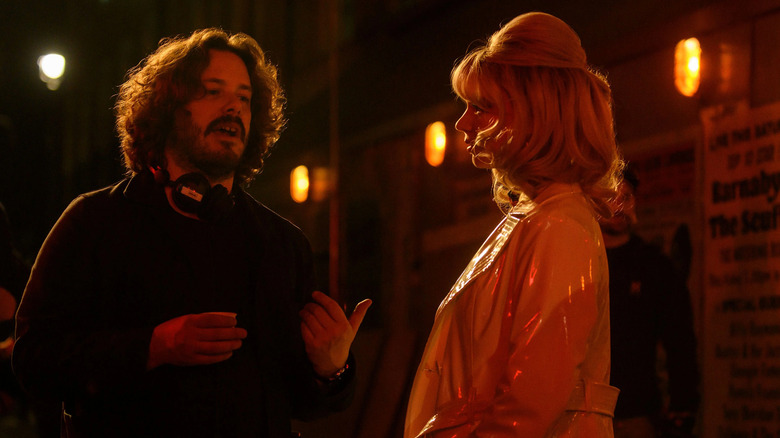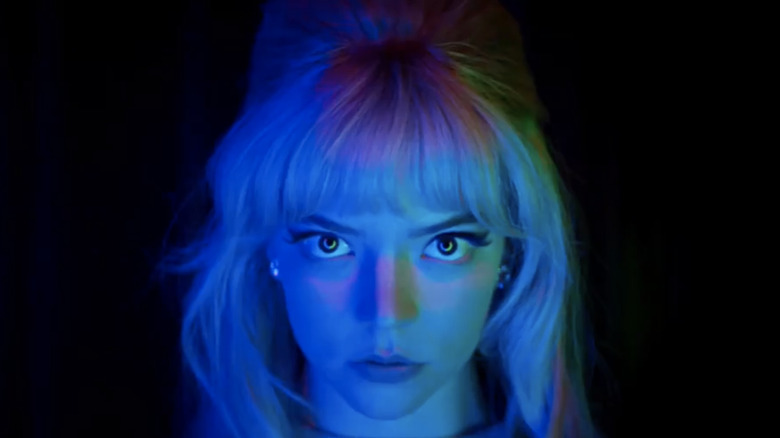
The most exciting thing about "Last Night in Soho" is that it feels unlike any other Edgar Wright film, while being, unmistakably, an Edgar Wright film. This is undeniably the filmmaker who made "Shaun of the Dead" and "Scott Pilgrim vs the World," but his work on this new London-set, time-jumping horror movie is far removed from his earlier filmography. Before our very eyes, an already-skilled filmmaker has refused to keep doing the same thing. It may feel insulting to say he's grown up, so let's say he's evolved.
Welcome to the next generation of Edgar Wright movies, which refreshingly refuse to lean on any on the familiar quirks that defined the films that made his name.
Winking And Nudging

Much digital ink has been spilled about Wright's first four movies — the "Cornetto" trilogy consisting of "Shaun of the Dead," "Hot Fuzz," and "The World's End," and the graphic novel adaptation "Scott Pilgrim vs the World" — and for good reason. They're terrific. And they're made for movie fans by a movie fan, a filmmaker who breathes in pop culture and exhales cinema, reconfiguring it through his own amused and amusing filter. And naturally, movie fans took notice. Even while his films didn't burn up the box office, they developed passionate, and immediate, followings. There's a real "one of us" quality to the fandom surrounding the early Wright movies: folks who loved movies recognized one of their own.
And Wright's early movies acknowledge this proudly. "Shaun of the Dead" wears its George A. Romero influences loudly and proudly, from its title to its gruesome third act. "Hot Fuzz" literally features a movie buff as a lead character, allowing him to gleefully point out action movie cliches the cast indulges in and subverts. "Scott Pilgrim" is lighter on the movie references, swapping them out for needle drops and one-liners intended to elicit grins from anyone who has ever held a video game controller.
Wright's movies never lacked an emotional core (the comedy is never at the expense of three-dimensional characters!), but they were movies that were aware they were movies. They winked. They nudged. They were in on the joke and knew you were too.
So, what happens when Wright stops the winking and the nudging?
A Voice Of Its Own

It's not that "Last Night in Soho" abandons Wright looking to the past for inspiration. He has name-checked "Repulsion" and "Don't Look Now" as touchstones for his new movie, which follows a young student (Thomas McKenzie, who is frankly astonishing here) whose new flat turns into a window to the 1960s, allowing her to witness the past and unlock a gnarly ghost story that consumes and destroys her life.
The big difference between this film and the director's earlier work is that "Last Night in Soho" never plays as an extended love letter to the movies from which Wright took inspiration. The film is happy to stand alone, never asking you to chuckle along with a deliberate homage to a movie you've seen before. There's a quiet confidence to it — it's a terrific movie because it's terrific, not because it's subverting something you already love. Wright is no longer nudging.
Whereas past Wright movies saw him gleefully leaning on familiar style and iconography, "Last Night in Soho" feels like its own thing. Its confidence is eerie, its style subtle but astonishing (you'll wonder how they pulled off so many key scenes once it clicks how impossible they seem). Wright knows that power of letting veteran performers like Terence Stamp and Diana Rigg operate as characters, rather than reference their past roles. He knows to put his own story — which is twist-y and fun and scary — first. Edgar Wright has realized that an Edgar Wright movie can be more than the sum of its winking references. It can hold its own, his style and his actors and his storytelling being the stars rather than the admittedly giddy thrill of "let's watch him take on another genre and lovingly twist it inside out."
Edgar Wright 2.0

This transformation has been a few years coming. "Baby Driver" saw Wright deliver his first mainstream smash hit, a heist movie powered with the soul of a musical. "The Sparks Brothers" is one of the more unique and stylized musical documentaries you'll ever see. But "Last Night in Soho" confirms that we've entered the age of Edgar Wright 2.0, an era where the filmmaker clearly feels a desire to reinvent what people expect from him and his work.
You'll still find Wright's touchstones in "Last Night in Soho." His stories are intricately plotted, with seemingly every scene leading to a payoff that proves worth the wait. He's still one of the most clever stagers of scene transitions working today, moving us (and his characters) between locations and time periods with either grace and discombobulating force. And yes, his characters still sometimes say one thing and immediately do the opposite, the kind of wry comedy that's been a trademark since his television days. But now, they exist to serve this story, not to remind you of a dozen others.
I imagine there will be a crowd of movie fans who wonder what happened to the filmmaker who made "Shaun of the Dead," and why he'd make "Last Night in Soho" (and "Baby Driver" and "The Sparks Brothers"). But if there's one thing a seasoned cineaste like Edgar Wright knows, it's that filmmakers who stagnate are filmmakers who cease to be interesting. That makes "Last Night in Soho" Wright's greatest movie reference yet. He knows that the filmmakers with the most interesting legacies are those who know when to reinvent themselves.
Cue a young filmmaker building their name referencing these newer Edgar Wright films in their homage-laden first films. They're special enough, and unique enough to warrant that reaction from another artist. By taking this leap, Edgar Wright has officially done his part to create... Well, the next Edgar Wright.
Read our review of "Last Night in Soho" here. The film hits theaters on October 29, 2021.
Read this next: 5 Things To Love About Last Night In Soho [TIFF 2021]
The post Last Night in Soho Reveals the Thrilling Next Era of Edgar Wright [Fantastic Fest] appeared first on /Film.
0 Comments